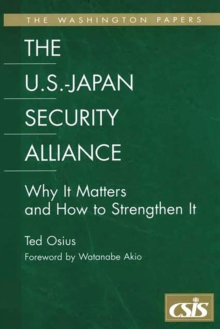
U.S. Intelligence: Evolution and Anatomy Paperback / softback
by Mark M. Lowenthal
Part of the The Washington Papers series
Paperback / softback
Description
No major twentieth-century power has so short a history of national intelligence agencies or activities as does the United States, and few have been as public or as tumultuous.
A major debate has now opened over the future structure, size, and role of U.S. intelligence in the aftermath of the cold war. This unique and fully updated book is a history of the U.S. intelligence community--as well as a detailed description of the organization and function of the major components of the community as they existed at the beginning of 1992.
A welcome and timely update of one of the most concise and objective guides to the history and structure of U.S. intelligence. Representative Dave McCurdy, Chairman, Permanent Select Committee on Intelligence, U.S.
House of RepresentativesThe history of the intelligence community can be divided into three distinct periods.
From its creation in 1947 until the revelations and investigations of 1974-1975, the intelligence community operated under fairly broad grants of authority based on trust.
After the Nixon administration, a previously dormant Congress was galvanized to write new oversight provisions and also took on a greater role as a shaper and consumer of intelligence.
With the collapse of the Soviet Union and the end of the cold war in 1991, the intelligence community found its role and even its necessity questioned due to the sudden absence of its major target.
Lowenthal emphasizes that a competent and challenged intelligence capability is an essential part of the U.S. national security structure, despite the status of external events or threats.
The major requirement of this structure, he says, is providing timely, objective, and pointed analysis to policymakers across a wide range of issues.
Information
-
Out of stock
- Format:Paperback / softback
- Pages:196 pages
- Publisher:Bloomsbury Publishing Plc
- Publication Date:21/08/1992
- Category:
- ISBN:9780275944346
Information
-
Out of stock
- Format:Paperback / softback
- Pages:196 pages
- Publisher:Bloomsbury Publishing Plc
- Publication Date:21/08/1992
- Category:
- ISBN:9780275944346










